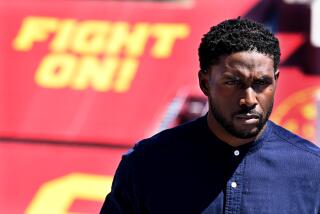UCLA and Noon Settle Defamation Case : Jurisprudence: Shotputter’s suit now will focus on U.S. Track & Field procedures and rules.
- Share via
Four years ago, Brent Noon graduated from Fallbrook High as California’s all-time best shotputter. But he soon discovered that with attention comes talk.
Particularly for the behemoths of track and field.
By the time Noon entered the University of Georgia 18 months after high school, he was rumored to be using performance-enhancing drugs. The three-time NCAA shotput champion claims in a $10-million suit filed last year that he was called a “steroid addict” by some within track and field.
He denied the rumors. But when U.S. Track & Field, the national governing body for the sport, suspended him about two months before the 1992 U.S. Olympic trials for missing an out-of-competition drug test, Noon brought action against coaches and officials.
Part of the suit was dismissed last month when Noon, 20, and UCLA reached a settlement in the defamation case. The agreement was confirmed this week by Noon’s father, Jim, and UCLA.
How UCLA and its assistant track coach, Art Venegas, became defendants in controversial drug litigation might have more to do with recruiting than anything.
“Who knows what drives people,” said Steve Wilhelm, a San Diego attorney representing Noon.
The shotputter alleged Venegas instigated drug rumors because Noon spurned his overtures to attend UCLA four years ago. Venegas told coaches and athletes he refused to recruit Noon because of his drug use, according to the suit. It also alleged other Pacific 10 Conference schools backed away from recruiting Noon because of the steroid rumors.
Furthermore, Noon contended that in April of 1992 Venegas told a group of athletes that the shotputter was “skipping around the country to avoid drug testing and that (he) took a year off (before college) to take drugs and get big.”
Anabolic steroids are said to promote muscle mass in large doses and are banned by most athletic organizations. They also are illegal to possess without prescription.
UCLA officials said in a statement Tuesday the settlement was reached to eliminate litigation costs. They denied any wrongdoing.
Terms of the agreement, reported to be almost $1 million, were grossly exaggerated, both parties said.
Venegas and Bob Larsen, UCLA’s track coach, could not be reached.
With the Venegas dispute settled, the case will focus on U.S. Track & Field’s drug-testing program. Noon hopes to prove he was unfairly treated by track officials.
The case is expected to be heard next week before Superior Court Judge Richard Haden in San Diego.
“USTF denies all the allegations at this point and it believes it will prevail at trial,” said Mike Rubino, a San Diego attorney representing the group.
Perhaps the most important point in the dispute is how USTF operates its two-prong testing program. American athletes can be tested during competitions or randomly during training.
Noon, who his attorneys say is not adverse to taking drug tests to ensure level competition, argues he was signaled out for testing because of the rumors started by Venegas.
Terry Singleton, an Escondido lawyer also representing the Noons, said track officials changed their protocol to include Noon in out-of-competition testing two years ago. At the time, it was supposed to include the nation’s top 15 throwers and Noon had yet to compete seriously with a 16-pound shot.
And when officials amended their guidelines to include Olympic hopefuls such as Noon, they never let the athletes know, the complaint alleged.
The suit claims The Athletics Congress, now known as U.S. Track & Field, had technical problems in its system.
“They seem to change the rules to fit whatever their focus is at the time,” Singleton said. “Hopefully, that is something we change as a result of this lawsuit.”
More to Read
Go beyond the scoreboard
Get the latest on L.A.'s teams in the daily Sports Report newsletter.
You may occasionally receive promotional content from the Los Angeles Times.










